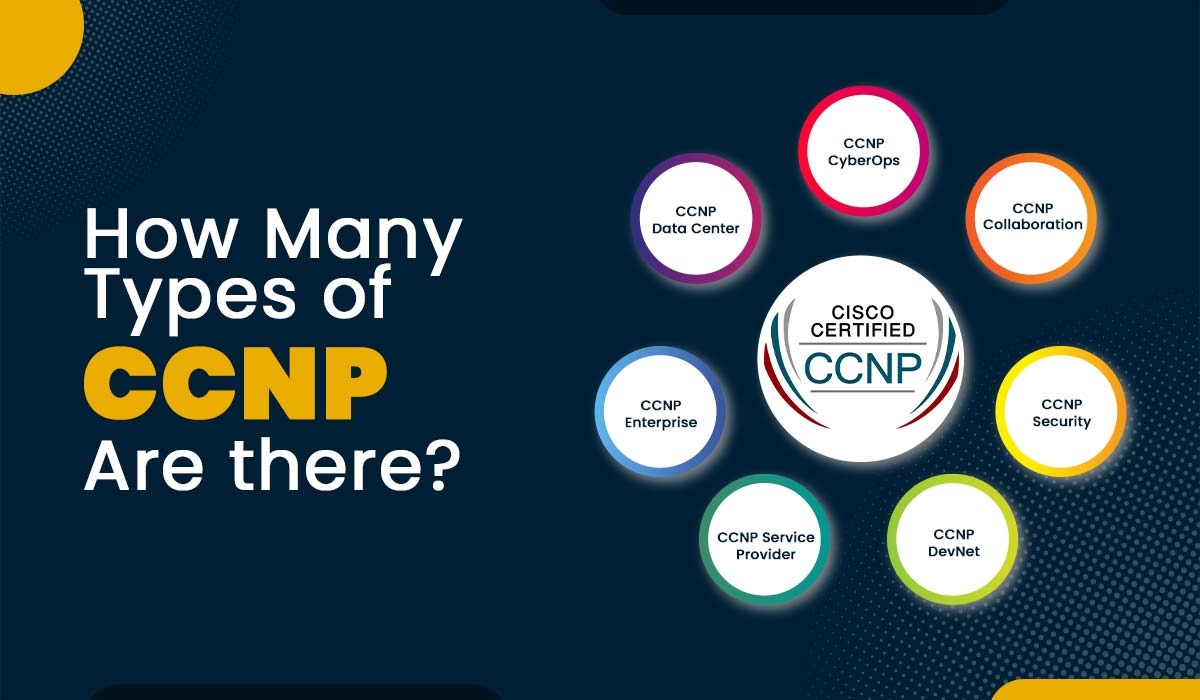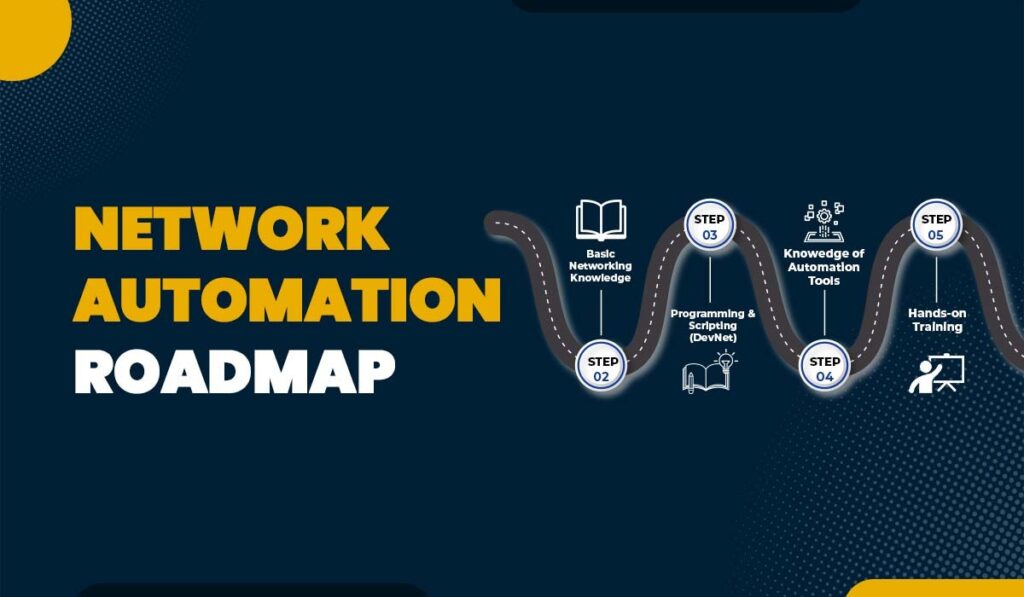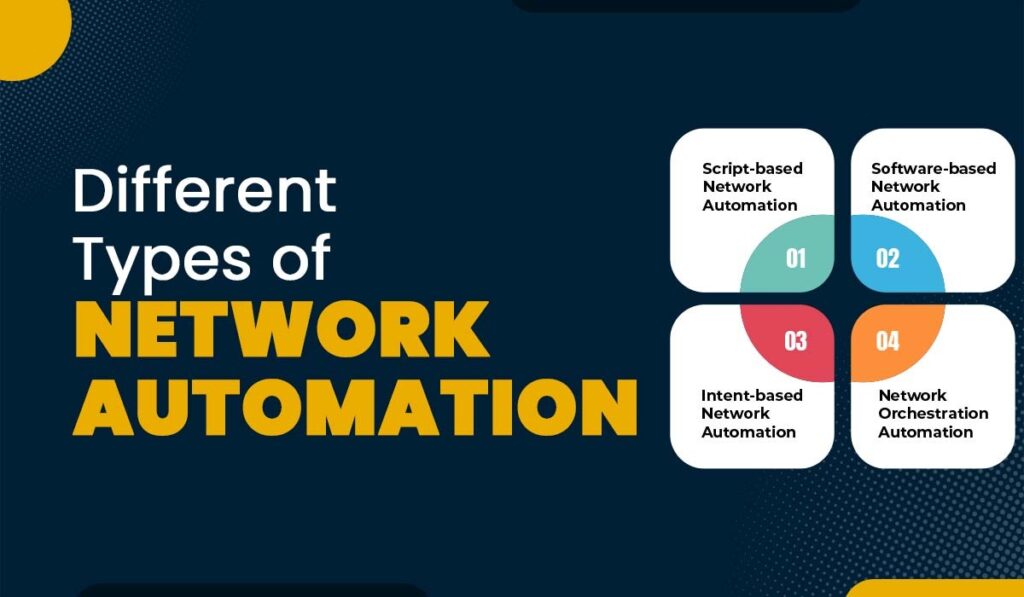Introduction
Cisco Certifications provide an effective means of staying current with the most recent Cisco products and services. Choosing one of the many types of CCNP helps network engineers in enhancing their skill sets. These certifications involve fundamental concepts that are applicable across a given technology domain while also providing candidates the opportunity to select a specific area of focus. If you are a network engineer looking to increase your knowledge base and qualifications, the CCNP certification may assist you in expanding your professional experience and expertise.
The CCNP certification is not a single certification. It is a program that provides several tracks and specializations for various professions and technology. In this blog post, we will explore the different types of CCNP certifications available and how they can help you advance your career.
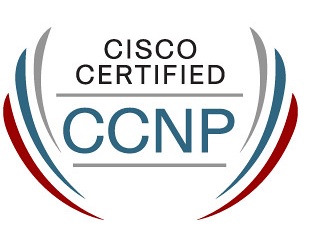
Before starting with the types of CCNP, let’s first understand the CCNP basics and why one should go for CCNP.
What is CCNP?
The CCNP is a certification offered by Cisco, a globally renowned company specializing in producing and distributing networking equipment. CCNP certification is considered to be an upgrade to the Cisco Certified Network Associate (CCNA) certification. Nonetheless, getting CCNA certification is not mandatory for undertaking the CCNP exam. You can also checkout – CCNA vs CCNP.
CCNP provides seven specializations to choose from, these are:
- Enterprise
- Service provider
- Data Center
- Security
- Collaboration
- CyberOps
- DevNet
The CCNP exam offers the option to customize your professional-level certification by selecting a core technology track and an additional concentration exam.
The CCNP core exams are centered on distinct Cisco technologies. Each core examination is accompanied by several concentration exams, from which you may select one to specialize in.
Reasons to go for CCNP
Enhancing or acquiring new skills is a beneficial practice for any job seeker. Let’s explain some of the reasons why pursuing a CCNP may benefit your career.
- CCNP Certification – Most experts consider technical certifications a critical success element and many organizations consider certifications before recruiting individuals.
- Completing CCNP certification provides an individual with the status of a specialist in the core aspects of Cisco technology.
- The CCNP is a prerequisite for taking the lab exam required to become a Cisco Certified Internetwork Expert (CCIE).
- Getting your CCNP certification is an excellent opportunity to demonstrate your expertise, expand your knowledge base, and provide you with the freedom to take on new responsibilities within your organization.
Now that we have seen what is CCNP and the reasons to go for CCNP, it is time to answer the question; How many types of CCNP are there?
Types of CCNP
CCNP certificates come in a wide variety of specializations. Let’s discuss each CCNP types in detail.
CCNP Enterprise
This certification serves to showcase the candidate’s proficiency in the field of enterprise networking solutions. To acquire this certification, it is essential to clear two separate examinations successfully. The first exam refers to the fundamental knowledge and skills required for the subject, while the second exam focuses on a specific area of concentration.
The core exam will test your knowledge of corporate architecture, including (IPv4 and IPv6) design, virtualization, networking assurance, security, infrastructure, and automation. Here is the complete syllabus of CCNP ENCOR. With a concentration exam, you can focus your professional career on a narrow area of expertise, such as the core network, SD-WAN, wireless, or automation.
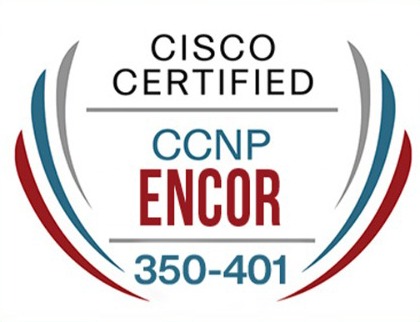
| Exam | Exam Code | Exam Name |
| Core Exam | 350 – 401 | ENCOR Implementing and Operating Cisco Enterprise Network Core Technologies |
| 300-410 | ENARSI Implementing Cisco Enterprise Advanced Routing and Services | |
| 300-415 | ENSDWI Implementing Cisco SD-WAN Solutions | |
| 300-420 | ENSLD Designing Cisco Enterprise Networks | |
| Concentration Exams | 300-425 | ENWLSD Designing Cisco Enterprise Wireless Networks |
| 300-430 | ENWLSI Implementing Cisco Enterprise Wireless Networks | |
| 300-435 | ENAUTO Implementing Automation for Cisco Enterprise Solutions | |
| 300-440 | ENCC Designing and Implementing Cloud Connectivity |
CCNP Service Provider
The CCNP Service Provider certification is designed for network engineers involved in managing and maintaining service provider networks. These networks may include broadband access networks (such as DSL/Cable), metro Ethernet networks, optical transport networks (such as DWDM), or mobile networks (including 4G/5G).
This certification serves as a confirmation of the individual’s expertise in service provider solutions. To get this certification, you must demonstrate expertise on two separate exams. The core exam tests an individual’s understanding of a service provider’s infrastructure.
It is beneficial to attempt and successfully pass any one of the concentration exams. The concentration exams provide the opportunity to concentrate on a particular domain of service provider networking, such as automation, advanced routing, optical networking, or VPN services.
| Exam | Exam Code | Exam Name |
| Core Exam | 350-501 | SPCOR Implementing and Operating Cisco Service Provider Network Core Technologies |
| 300-510 | SPRI Implementing Cisco Service Provider Advanced Routing Solutions | |
| Concentration Exams | 300-515 | SPVI Implementing Cisco Service Provider VPN Services |
| 300-535 | SPAUTO Implementing Automation for Cisco Service Provider Solutions |
CCNP Data Center
The CCNP Data Centre certification is designed for network engineers who specialize in managing and maintaining data center networks. This certification serves as proof of one’s proficiency in data center solutions. Two exams are mandatory to clear if you want to go for CCNP Data Center certification.
The core exam assesses one’s understanding of data center infrastructure.
The concentration examinations provide an opportunity to concentrate on a particular technology within the data center domain, including but not limited to ACI, DCNM, NX-OS, or SAN.
| Exam | Exam Code | Exam Name |
| Core Exam | 350-601 | DCCOR Implementing and Operating Cisco Data Center Core Technologies |
| 300-610 | DCID Designing Cisco Data Center Infrastructure | |
| 300-615 | DCIT Troubleshooting Cisco Data Center Infrastructure | |
| Concentration Exams | 300-620 | DCACI Implementing Cisco Application-Centric Infrastructure |
| 300-630 | DCACIA Implementing Cisco Application-Centric Infrastructure – Advanced | |
| 300-635 | DCAUTO Implementing Automation for Cisco Data Center Solutions |
CCNP Security
The CCNP Security certification is designed for network engineers specializing in security solutions and technologies. These professionals are adept at handling firewalls, cloud security, web security, VPNs, IPS/IDS, email security, and network access control. The CCNP Security certification encompasses fundamentals including secure access, threat defense, policy enforcement, and network security architecture.
This certification assists in enhancing your expertise in the security solutions domain.
The core exam assesses one’s understanding of security infrastructure. You must take and pass an exam in one of the available specializations. The concentration exams assist individuals in concentrating on a particular security technology or solution in the Cisco portfolio, such as Firepower NGFW, ISE, VPNs, or Umbrella.
| Exam | Exam Code | Exam Name |
| Core Exam | 350-701 | SCOR Implementing and Operating Cisco Security Core Technologies |
| 300-710 | SNCF Securing Networks with Cisco Firepower | |
| 300-715 | SISE Implementing and Configuring Cisco Identity Services Engine | |
| 300-720 | SESA Securing Email with Cisco Email Security Appliance | |
| Concentration Exams | 300-725 | SWSA Securing the Web with Cisco Web Security Appliance |
| 300-730 | SVPN Implementing Secure Solutions with Virtual Private Networks | |
| 300-735 | SAUTO Automating and Programming Cisco Security Solutions | |
| 300-740 | SCAZT Designing and Implementing Secure Cloud Access for Users and Endpoints |
CCNP Collaboration
The CCNP Collaboration certification has been modified to include automation and programmability, which can aid in expanding collaboration infrastructure. The CCNP certification is widely recognized in the industry and serves as an indication of possessing fundamental knowledge while also allowing for specialization in a particular area of interest.
The core exam evaluates one’s understanding of collaboration infrastructure.
The concentration exam provides an opportunity to concentrate on a particular collaboration technology or solution available in the Cisco portfolio, including but not limited to CUCM, Unity Connection, Webex Meetings, Webex Teams, or Contact Centre Express.
| Exam | Exam Code | Exam Name |
| Core Exam | 350-801 | CLCOR Implementing and Operating Cisco Security Core Technologies |
| 300-810 | CLICA Securing Networks with Cisco Firepower | |
| Concentration Exams | 300-815 | CLACCM Implementing and Configuring Cisco Identity Services Engine |
| 300-820 | CLCEI Securing Email with Cisco Email Security Appliance | |
| 300-835 | CLAUTO Automating and Programming Cisco Security Solutions |
CCNP CyberOps
The achievement of this certification serves as evidence of one’s expertise in the domain of collaboration solutions. In order to obtain this certification, it is necessary to pass two examinations.
The core examination evaluates an individual’s understanding of fundamental security operations, covering the basics of cybersecurity, methodologies, processes, and automation.
It is beneficial to attempt and successfully pass any one of the concentration exams. The examination will assess your understanding of incident response and digital forensics.
| Exam | Exam Code | Exam Name |
| Core Exam | 350-201 | CBRCOR Performing CyberOps Using Cisco Security Technologies |
| Concentration Exams | 300-215 | CBRFIR Conducting Forensic Analysis and Incident Response Using Cisco Technologies for CyberOps |
| 300-220 | CBRTHD Conducting Threat Hunting and Defending using Cisco Technologies for CyberOps |
CCNP DevNet
This certification serves as proof of one’s expertise in the creation and upkeep of applications built on Cisco platforms. In order to acquire this certification, it is necessary to pass two examinations successfully.
The DevNet core exam examines one’s understanding of software development and design, covering the utilization of APIs, Cisco platforms, application deployment, security, infrastructure, and automation.
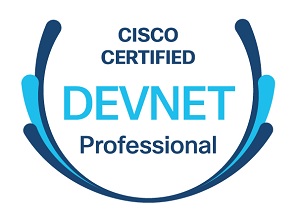
The concentration exams will assess one’s knowledge of various subjects, including enterprise automation, collaboration automation, data center automation, service provider automation, security automation, DevOps automation, IoT, and Cloud.
| Exam | Exam Code | Exam Name |
| Core Exam | 350-901 | DEVCOR Developing Applications Using Cisco Core Platforms and APIs |
| 300-435 | ENAUTO Automating and Programming Cisco Enterprise Solutions | |
| 300-535 | SPAUTO Automating and Programming Cisco Service Provider Solutions | |
| 300-635 | DCAUTO Automating and Programming Cisco Data Center Solutions | |
| Concentration Exams | 300-735 | SAUTO Automating and Programming Cisco Security Solutions |
| 300-835 | CLAUTO Automating and Programming Cisco Collaboration Solutions | |
| 300-910 | DEVOPS Implementing DevOps Solutions and Practices using Cisco Platforms | |
| 300-915 | DEVIOT Developing Solutions using Cisco IoT and Edge Platforms | |
| 300-920 | DEVWBX Developing Applications for Cisco Webex and Webex Devices |
Note: Each professional certification mentioned above has a validity period of three years, requiring recertification after that. Recertification is a crucial factor in one’s proficiency in staying on top of the latest technological advancements within the field of Cisco. There is no limit to the number of times one can undergo recertification.
These are the different types of CCNP. Now, let’s see how to get CCNP Certification.
How to become CCNP Certified?
To get your CCNP certification, you must pass the core and concentration exams. The minimum score for passing is flexible but often falls between 800 and 850 out of 1000.
Both the core exam and the concentration exam include anywhere from 70 to 100 questions. The duration of both the core and concentration exams is 120 minutes.
Both tests are administered individually. To become a fully certified Cisco Certified Network Professional and get a CCNP certification, you may take the core exam first and the other exam afterward, so long as you take both exams within the validity period of 3 years. Take a look at if CCNP is worth it or not?
Frequently Asked Questions
Q1. How many types of CCNP are there?
There are seven different types of CCNP, which are – CCNP Enterprise, CCNP Service Provider, CCNP Data Center, CCNP Security, CCNP Collaboration, CCNP CyberOps, and CCNP DevNet.
Q2. Which CCNP is best?
There is no such thing as best CCNP. It depends on various factors and differs person to person. However, we suggest that one should take CCNP Enterprise because it teaches advanced routing and switching, which is important for all network engineers.
Q3. How many certifications are there in CCNP?
There are two exams in the CCNP certification – Core and Concentration. Every specialization has its own core exam and various concentration exams to choose from.
Q4. Can I pass CCNP without CCNA?
Yes, it is totally possible to pass CCNP without CCNA. You don’t need to earn CCNA Certification to pass or take the CCNP Certification. However, one needs to study CCNA to learn the networking basics and understand CCNP.
Conclusion
In this blog post, we have discussed what CCNP certification is and CCNP types. We have seen that CCNP certification is a high-level certification that validates the skills and knowledge of network professionals in different specializations and domains.
We have also seen that there are seven CCNP types of certifications currently offered by Cisco: CCNP Enterprise, CCNP Data Center, CCNP Security, CCNP Service Provider, CCNP Collaboration, CCNP CyberOps, and CCNP DevNet. Each types of CCNP certification requires passing two exams: a core exam and a concentration exam.
By getting a CCNP certification that suits their career path and interests, network professionals can boost their credibility and employability in the IT industry.

